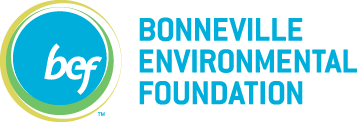Partner Profile | Bonneville Environmental Foundation


Both organizations had been collaborating with mutual partner the World Resources Institute (WRI) on expanding environmental projects and the diversity of funders participating in those projects. WRI helped connect BEF and Blue Forest to begin exploring the best current opportunities to work together towards these multiple shared goals .
Written by: Jessica Alvarez, Communications & Content Manager
Bonneville Environmental Foundation (BEF) is a national nonprofit that empowers businesses to be in balance with the environment through a full suite of environmental products, educational and community engagement programs, and custom solutions that help partners address their unavoidable energy, carbon and water impacts. BEF works extensively with corporations helping them develop and implement water stewardship strategies, which includes investment in watersheds and catchments across North America and internationally.
“We’re always looking for catalytic and transformational projects that ultimately will achieve many different co-benefits and scale up impacts related to water and carbon along with habitat and communities. As a result, we’re constantly looking for NGO partners that are developing new out-of-the-box strategies that can increase the scale of impact related to water and ecosystems,” explained BEF CEO, Todd Reeve.
This ambition is precisely what drew the organization to Blue Forest’s work. Both organizations had been collaborating with mutual partner the World Resources Institute (WRI) on expanding environmental projects and the diversity of funders participating in those projects. WRI helped connect BEF and Blue Forest to begin exploring the best current opportunities to work together towards these multiple shared goals .
According to Reeve, the opportunity to partner with Blue Forest was an advantageous one as both organizations’ missions align in many ways.
“Headwater protection is one of the most important things we as a society can work on in terms of predictable long-term water supply, clean water, habitat, and carbon – all of these things tie into healthy headwater catchments and Blue Forest is certainly a leader in this area,” he explained.
“Innovative finance, as we all know–thinking about and exploring ways to bring more funders to the table to expand the slice of the pie with creativity and innovation–will certainly be one of the tools required to get the job done. There is tremendous overlap with BEFs interests and Blue Forest’s tools and expertise in this space.”
Most importantly, he explained, BEF’s commitment to understanding the co-benefits—how these overlap and reinforce each other—together with Blue Forest’s focus on delivering downstream water benefits make for a valuable partnership.
BEF has three goals for this partnership:
-
To build awareness among the private sector of the potential to scale up this work through collective impact.
-
To showcase and demonstrate that there is a pathway to achieve large-scale forest resilience that has water, habitat, community, and carbon benefits.
-
To enlist support from new corporate partners and provide direct benefits to the companies that deliver community and water resilience in California and other geographies.
The first of these corporate partners opened a window of opportunity for this type of financial support for Blue Forest last year on our Yuba II project. Danone, a longtime partner of BEF, has worked collaboratively with them for over a decade to help support and invest in high-impact water solutions and water projects. BEF helped Danone understand the uniqueness of the Yuba II project and the co-benefits from fire resilience and community protection to downstream water supply. As a result of that proactive engagement, Silk, a Danone brand, was eager and willing to participate in this project as an example of how to expand that company’s impact and generate benefits from water to habitat to fire resilience in California and headwaters in the Yuba.
“We’re quite confident that this is just the tip of the iceberg, and the kind of solutions that the FRB model can provide directly intersect with the goals of many companies with operations in California and other regions. Importantly, this innovative financing approach can generate the kind of outcomes that these companies are looking to report on and achieve,” said Reeve.
As for the future of the BEF and Blue Forest partnership, Reeve believes that we are at the point where we’re really showing the potential to scale the model to bring more partners to the table and deliver more outcomes that are critical to a diverse suite of stakeholders.
“I think it’s a fantastic situation where different partners with expertise in very specific areas are able to come together and deliver immense value through a project like Yuba II. I think it’s a fantastic model of how we take a whole series of pilot efforts and we ultimately roll them up into something bigger and more durable with higher impact using diverse partners.” he concluded.